- Home
- Tarryn Fisher
Marrow Page 2
Marrow Read online
Page 2
So I remember the old mother, tracing the past, recoloring the memories. The weight of bad memories blossoms and expands under the good memories. I try to think only of those—the good things that carve me into my childhood, not the ones that carve me out of it.
I think of the way my mother always had a leaf between her fingers. That’s what I remember most. She’d pull one from a bush or a tree and hold it between her fingers, compulsively rubbing little circles until the leaf was rubbed clean of its veins and membranes and her fingers were stained green. I liked when her fingers were green; it reminded me of the finger paints we used at school. It made her seem strange and fun, organically different from the other mothers who were always sour-faced and stiff. When we were outside, I’d study the way she’d examine the plants, mimicking her movements, wanting to be close to her, wanting to be her. And it was difficult because my mother carried her grace around her shoulders, a regal class that was almost impossible to imitate.
That was when I was real little and things were almost right. Before she lost her job at Markobs and Jacob, before she started smoking, before the men. Nowadays, my mother’s fingers are stained with nicotine. The smell rolls off her skin when she moves across a room—stale smoke and tobacco rot. Her shoulders hang from her neck like an old housecoat. When she stopped leaving the house a few years ago, she would send me out to buy cigarettes, the ones with the Indian chief on the carton, because they were healthier for you. Somewhere in between her smelling like the outdoors, and her smelling like an ashtray, I stopped wanting to be her. And during that same time, while she was shrugging off the mantle of parenting and becoming a stranger, she stopped saying my name.
At first I didn’t notice it. It wasn’t until a teacher said my name at school, calling me to the front of the class to solve an equation, that I realized I hadn’t heard it in some time. My mother still delivered commands, but at some point skimmed my name from the top of them. Margo. It took me a minute to recognize that it was me Mrs. Lerson was calling. The other students laughed as I made my way through the line of desks to stand in front of the blackboard. Margo, I thought. That’s me. And then, as I walked home from the bus, I tried to remember the last time I heard her say it, and I couldn’t.
My mother, a Perry Mason fan, named me after Margo Albert, an actress she once saw on his show, The Case of the Sad Sicilian. In Margo’s final role, before she died of brain cancer, she played a murderess named Serafina. My mother, stricken by her doleful eyes, vowed to name her first daughter Margo. It feels like a cruel joke to be named after a woman who was cast in tragic roles, and even more so to have the meaning of one’s name be something so beautiful and delicate when you yourself are anything but.
In the eating house, I remain nameless. White blonde hair, forgettable eyes, ugly, tattered clothes.
“Hey Margo!”
I spin around. The school bus is retracting its STOP sign, doors closing. Destiny comes barreling down the sidewalk toward me, slinging her backpack over her shoulder. I eye the cut of her jeans, and the way her shirt hangs fashionably off her shoulder. She’s even wearing the type of shoes the other girls are wearing: sparkly flats. She stopped speaking to me sometime around seventh grade, after the kids at school started calling me “the whore’s daughter.” I don’t know if it was by her parents’ command or self-preservation, but she just left me.
“You forgot this on the bus,” she says, handing me the paperback novel I’d been reading. I take it from her without meeting her eyes.
“Thank you.”
Her house is in the opposite direction, but she hesitates before leaving like she wants to say something. In the end, though, she just shrugs and walks away. I don’t watch her go. I know if I do, I will cry.
The eating house is still when I get home. It naps during the day while I am at school: a night house. I go straight to my room, because that’s what she likes me to do. It’s later in the afternoon that she emerges from her bedroom to begin her ritual for her night: the washing and applying of creams and makeup. In recent years, she hasn’t wanted me around, not even for her bath. And I don’t care. I hated watching her wrinkle in the chipped, rose-colored bath, pieces of paint peeling off and floating in the water around her. I pull out my box, choosing a candy bar and a warm can of Mountain Dew, and begin my homework as the eating house wakes up and creaks around me.
When the first of her visitors come, I pack up my notebooks and pencils and crawl to the wall that separates my bedroom from hers. This is the way I know her. She has not gone completely silent. I hear her speaking to them. I am so desperate for the sound of her voice; I spend nights pressing my ear between our walls. They tell her things—things about their lives, and their wives, and their jobs. They punch up their sentences with words like fiscal year, college tuition, and parole violations. She only speaks when they need her to. She’s perfected the art of the pause and response. A word here, a word there. Her voice never changes from an agreeable purr. They find it sexy, her willingness to listen and her reluctance to speak. A beautiful woman who does, and does not disagree. I am learning so much about men, the way they want and what they want. They pace her bedroom, their heavy steps a dull thud on the chipped and marred wood of the eating house. Once I hear her give advice: Sell the house, downgrade. You don’t need all of that space now that the kids are gone.
Where is my advice? I wonder. Where are my words? Whose kid am I?
WESSEX, a street cobbled with crack, crack whores, dealers, drunks, girls who had barely dried the milk from their own chins before giving suckle to their little undernourished babies. It is pitiful, this thing we call life. I know that, but I’m not sure they do. One grows accustomed to suffering, especially in a place like Bone Harbor. You take your first steps, everyone claps, and then you cease to be remarkable. Nearly surrounded by water, it used to be a harbor before they moved it farther south to be closer to Seattle. But that was before my grandmother was born. The people around here call the area the Bone. A kind of joke that developed after all the business dried up. I kind of like that they call it that. No use calling yellow, blue. And that’s what we are, rubbed down to the bone.
Six days a week I take the bus to work. To get to the bus, I have to walk up Wessex and down Carnation. Carnation is only slightly better than Wessex. The windows aren’t broken, and a couple people mow their grass. The people who live on Carnation Street call us trash. I suppose in a world such as this, unbroken windows and mowed grass make all the difference.
God is not in the houses that stand side-by-side down Wessex. I wonder if God lifted Himself from this place and put us behind a veil to suffer alone. It’s a nightmare street. The people in the outside world don’t know we exist. They don’t want to know. But our houses stand, almost collapsing under the weight of the sin they contain. Before the eating house comes the crack house. Before the crack house comes Mother Mary’s house. Mother Mary can see the future, but not any future. She can only tell you how you’ll die, and she’ll charge you forty dollars to do it. Which brings us to the bad people house. I only call it that because it’s where the ex-cons hole up after they’re released from prison. I don’t know what they get up to in there, but once a week there’s an ambulance outside and someone is hauled out on a stretcher.
There is only one house I like on Wessex Street. It’s the very first house on the block, and it belongs to Delaney Grant. Delaney grows pot in her garage. She doesn’t even sell it. She just smokes it all herself. Everyone calls her greedy. Sometimes, when there’s a pot shortage at the crack house, you can see people knocking on Delaney’s door. But she chases them away with a shotgun she calls Horace.
The reason I like Delaney’s house is because her son, Judah, lives there. Part of the time. The times he’s not with Delaney, he’s with his dad. We’ve never actually spoken, but he sits out in the yard a lot, and he always waves when I walk by. When you look at him you forget that he’s in a wheelchair. He’s handsome, and he’d be tall if he
stood up. Six feet at least. He never went to school with the rest of us. A bus came to pick him up every morning. It could fit his wheelchair, and it drove all the way from the city. Delaney pissed her own life to shit, but when it came to Judah, she made sure the world saw him. You had to kind of like her for that. Especially when you had a mother like mine.
The bus is late. I tap my foot impatiently and crane my neck to peer down the street. If the 712 gets here in the next five minutes, I can still make it to the Rag O Rama in time for my shift.
“Good times,” I whisper as I see it bouncing around the corner. There are three of us who climb onto the 712: myself, Cuoco, one of the neighborhood heroin addicts, and little Nevaeh Anthony who catches the bus to her grandmother’s house every afternoon while her mother works.
“Hi Margo,” she says.
“Hi, little girl. You going to Granny’s house?”
She nods.
“Good. Walk fast once you get off the bus. You know how it is after dark.” Nevaeh nods. She knows. We all know. Splintered in between the normal things like school, grocery shopping, and work are the things that belong to the Bone. A fear that wanders like a mist through the streets. We live with it chained to our ankles. It’s so tangible that there are rarely visitors, and when they come, whether to visit a family member or to pass through, they hurry out, usually cutting their trips short.
“Let me fix your hair,” I say, and Nevaeh scoots closer to me on the bench. “Have to look pretty for Granny,” I tell her. She nods in agreement. My fingers work deftly as rain pounds against the windows. I finish her braids as the bus stops and right as she finishes telling me about her good report card, counting out the ten dollars her granny gave her as a reward. I watch her pull out a marker and draw a heart on each one. We climb off together, pulling our hoods up over our hair. She waves to me as we head in opposite directions, her fingers spread like starfish. I watch for a minute as she bounces down the street, her Hello Kitty backpack slung over her shoulder, bright colors cast against a gloomy day. I look at Destiny’s old house as I walk by. It’s green now, with white flower boxes on the windows. Her family moved to Oregon a few years ago. After she moved, she wrote me a letter, and then I never heard from her again. I wrote twenty before they started to come back with RETURN TO SENDER stamped on the envelope. Oh well. Letter writing is a luxury anyway.
The Rag O Rama smells like shit. Literally. The sewage plant is right across the river. Sandy, the manager, has those room deodorizers all over the shop, stuck in corners and up on shelves, but all it does is make the Rag smell like shit covered in apple blossom.
Because I’m thirty minutes late, Sandy makes me sort through inventory in the back room. I eye the black garbage bags lined against the wall, stuffed so full that half of them have split open, pant legs and shirtsleeves spilling out like intestines. There are only seven to sort through today. Sandy makes us save the bags that aren’t damaged. “Money don’t grow on no trees,” she says. “This is a thrift shop. We reuse everything.” Which leaves me plucking at the knots, swearing under my breath as sweat runs down my back and between my breasts. I untie the first one and spread the bag open. The musty smell has become familiar to me; it is the smell of un-wash, of people’s homes, mothballs, and occasionally—if we get a bag from an Indian family—tumeric and cumin. I separate the things inside: clothes in one pile, toys in another, household items in the third. It’s funny how one person’s crap can be so valuable to someone else. Employees get half off anything on the sale rack. It’s the things people don’t want times two. I finish off a bag and start to fold it when I feel something I missed at the bottom. I pull out a large canvas bag—the kind rich people take to the store to avoid using plastic. “Groceries & Shit” is stenciled on the front. I laugh. Its last owner drew stars around the words in purple sharpie.
“Groceries and shit,” I say out loud. Sandy walks in carrying an armful of hangers. “You can keep that,” she says. “It’s your summer bonus.”
I roll my eyes, but I am secretly pleased. It’s not often you get something for free in this life. I fold my new bag into a square and tuck it into the back of my pants so one of the other girls doesn’t take it.
Sandy’s boyfriend, Luis, hits her. She tries to hide the bruises, but there are a lot of them, and she wears makeup that’s about three shades too light for her skin. On the days he doesn’t hit her, she brings us stale doughnuts from the place where he works. I saw the empty box in the trash when I got to work. It’s a good day for her.
When Sandy feels like I’ve been punished enough, she sends me up front to work the register. It’s mostly a boring day until a woman tries to steal a pair of shoes. Sandy catches her before she can walk out with them stuffed under her jacket. The woman can barely stand she’s so drunk. Sandy grabs her by the forearm and shoves her into a chair in the office. She tells me to call the police.
“Maybe we shouldn’t,” I say. “Look at her, Sandy.” The woman is rocking back and forth, clutching her chest and mumbling something that sounds like Zeek.
Sandy doesn’t look at her. She looks at me. “I thought you wanted this job.”
I do. I really do. If I didn’t have this job I’d have to be home. And if I were home…
I call the police.
The police arrive forty minutes later with grease stains on their pants, looking bored as hell. They load the woman into the back of their cruiser and drive away. I carry the shoes back to their rack on the children’s side of the store. They’re a beat up pair of Jordan’s. The price tag says six dollars. She didn’t even have six dollars. I wonder if she spent the six dollars getting drunk. The shoes were probably for her kid. That’s the way of things here. Your thoughts go to yourself first, and if there are a few thoughts left, your children might get them. But from my experience, the only things children get in this neighborhood are drunk parents and partially full stomachs. You’re alive, you’ll survive. That’s what my mother used to tell me.
Before my shift ends, I pay for the shoes and shove them in my new Groceries & Shit bag. I walk the two blocks to the bus stop with my head down. It’s raining—warm rain—not the cold kind that makes your bones ache. I wish I had money for a coffee, but I spent what I had on the shoes, and I need the rest for bus fare. I decide to walk the five blocks instead. I stop at a food truck and hand them my bus fare. In exchange, I get a paper cup of coffee with a dash of cream and three sugars. It’s delicious.
The police station on Bone Harbor Hill is always busy. I walk into the lobby and a dirty-faced toddler crashes into my legs. A baby cries, a woman curses, a man who barely speaks English is arguing with a clerk. “A meeestake! A meestake!” he cries. I look around, trying to decide if this is worth it, when I see one of the cops who came to the Rag O Rama to arrest the woman. He has a gym bag slung over one shoulder, and the look of a man who just ended his shift.
“S’cuse me,” I say. He is reluctant to stop. “Excuse me,” I say louder. He is wearing sunglasses despite the lateness of the day. I stare at my own reflection and say, “The woman you picked up earlier from the Rag O Rama. Is she still here?”
He sticks his thumbs in his belt loops like he’s some kind of boss, and looks at me like he’s trying to place my face. He won’t be able to.
“Yeah, why?”
I shove the shoes at him. “She left these there,” I say. And then I turn and leave without looking back. My own shoes, the ones on my feet, are the only shoes I own. Torn up sneakers from the Wal-Mart clearance rack. You can do without a lot of things in this life, but shoes are a necessity. If you’re stealing shoes, it’s a desperate necessity. And I will not stand in the way of people trying hard to survive.
I’M WALKING TO THE CORNER STORE for healthy cigarettes, watching the way the fat of my knees bulge with each step, when I see him. He’s reading a book, his head leaning on his upturned palm. There is a glass of water beside him, untouched and filled to the brim, sweating. The fact that he looks so at eas
e with himself is what abruptly redirects my feet from the cracked sidewalk to the pathway that leads to his gate. I smile. I don’t smile. I wring my hands. I fold them behind my back. No one really knows if it was a car accident, or a tumor, or something like Multiple Sclerosis that made Judah Grant a cripple. We knew him when he walked on his legs, then one day he couldn’t. As I watch him, I have a thought that startles me in its clarity. He wears his wheelchair. His wheelchair never wears him. I’ve never had this thought before. As a general rule, I try not to look at Judah. Staring at someone in a wheelchair doesn’t seem polite—even if he is beautiful.
There is a fence surrounding his yard. It was once pretty; you can still see the remnants of eggshell blue paint in some places where the rust hasn’t eaten through it. I remember being little and thinking the fence looked like Easter. The gate groans loudly as I push it open with my fingertips. Judah’s head comes up, but not at once. He’s so casual as he sets his book aside and watches me walk up the ramp that Delaney had built for his chair.
“What are you doing?” I ask him. I glance down at the book he is reading. It’s a biography.
He holds up the thin joint between his fingers. It smells hella strong. Like weed smoking weed.
“Can I have some?” I ask.
His eyes lightly graze me. “I’ve never seen you smoke,” he says, and makes no move to pass me the joint. His voice is clear and deep.
“You never see me,” I say.
“Sure I do.” He puts the joint between his lips, sucks in a little. He exhales before he says, “You walk past here every day to go to work.”
I tuck my chin in, surprised. “How do you know I’m going to work?”
“Dunno,” he replies. “Maybe because you look miserable.”
He’s right, of course.
“Okay,” I say. “So you see me walking to work once a day and you suddenly know me?”

 Jackal
Jackal F*ck Love
F*ck Love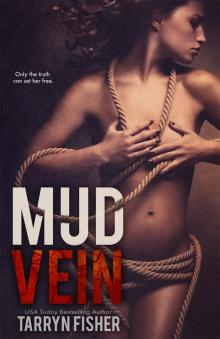 Mud Vein
Mud Vein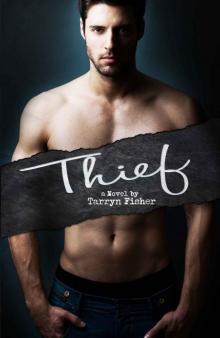 Thief
Thief Marrow
Marrow Dirty Red
Dirty Red Folsom
Folsom The Opportunist
The Opportunist Atheists Who Kneel and Pray
Atheists Who Kneel and Pray Bad Mommy
Bad Mommy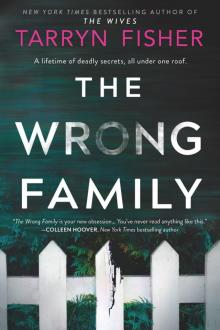 The Wrong Family
The Wrong Family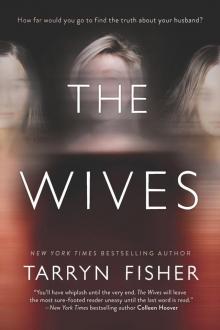 The Wives
The Wives Jackal (The End of Men Book 2)
Jackal (The End of Men Book 2) Folsom (The End of Men Book 1)
Folsom (The End of Men Book 1)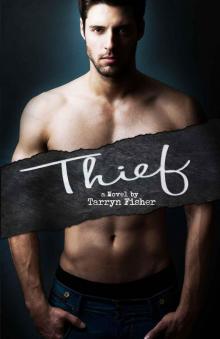 Thief (Love Me With Lies #3)
Thief (Love Me With Lies #3)